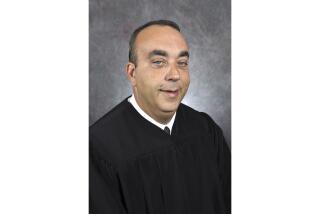His U.N. honeymoon is short-lived
On his first official day on the job, Secretary-General Ban Ki-moon stepped back from the United Nations’ long-standing opposition to the death penalty, saying capital punishment was an issue for each country to decide.
Ban’s statement Tuesday contrasted sharply with his predecessors’ rejection of the death penalty and the U.N. special envoy to Iraq’s condemnation of Saddam Hussein’s execution.
To U.N. watchers scrutinizing Ban’s first moves, the remarks signaled that he would be more cautious than predecessor Kofi Annan in using the secretary-general’s post as a bully pulpit, and that he was not afraid to depart from traditional U.N. positions.
Ban, responding to a question about the weekend execution of Hussein, said the former Iraqi leader “was responsible for committing heinous crimes and unspeakable atrocities against the Iraqi people. We should never forget the victims of his crimes.”
But, he said, “The issue of capital punishment is for each and every member state to decide.
“At the same time,” he added, “I would hope that the international member states would pay due regard to all aspects of international humanitarian laws.”
It was Ban’s first official statement as secretary-general, and his first lesson that every word he says counts. His aides spent the rest of the day trying to explain his comments.
Michele Montas, his new spokeswoman, said there was no change in U.N. policy and what Ban said “was his own nuance” on the death penalty.
Ban’s native South Korea employs capital punishment, as does the U.S., China and Russia, three of the permanent members of the Security Council.
“The U.N. policy still remains that the organization is not for capital punishment,” Montas said.
The stance voiced by Annan and High Commissioner for Human Rights Louise Arbour was that out of respect for human rights, the U.N. did not support the death penalty. Ashraf Jehangir Qazi, the U.N.’s special representative to Iraq, strongly reiterated that position after Hussein’s hanging.
Human rights groups say the death penalty is not a clear-cut issue under international law. An optional protocol to the legally binding International Covenant on Civil and Political Rights says the abolition of the death penalty contributes to human dignity and rights.
“We feel strongly that he missed an opportunity to make an unequivocal statement about the death penalty, which we believe is a human rights abuse, and we look forward to stronger positions in the future,” Peggy Hicks, global advocacy director for Human Rights Watch, said, referring to Ban.
At his informal news conference in front of the Security Council chamber, Ban also said that the crisis in Sudan’s Darfur region was “very high on my agenda,” and that his first trip would be to an African Union summit at the end of the month in Addis Ababa, Ethiopia, where he planned to talk to Sudanese President Omar Hassan Ahmed Bashir.
North Korea’s nuclear ambitions are another priority, Ban said, and he told reporters that he would do whatever he could to help the six-party talks. As the former foreign minister in South Korea, he was directly involved in the talks and has pledged to be personally engaged in the issue.
He said that he was beginning his duties at a daunting time and that the world’s crises needed to be addressed as a common effort.
“Not a single person, including the secretary-general of the United Nations, not a single country, however strong,” can deal with the challenges alone, he said.
In U.N.-speak, analysts said, that means the secretary-general should not be blamed when things go wrong and that powerful countries, particularly the U.S., should work with the world body.
Ban has started selecting his Cabinet, a process that usually aims to balance merit with geographical representation.
His first appointment was his chief of staff, Vijay Nambiar, a former undersecretary-general and ambassador to the U.N. from India.
Ban’s spokeswoman, Montas, is a broadcaster from Haiti who joined the U.N. after her journalist husband was slain in 2002.
More to Read
Sign up for Essential California
The most important California stories and recommendations in your inbox every morning.
You may occasionally receive promotional content from the Los Angeles Times.










